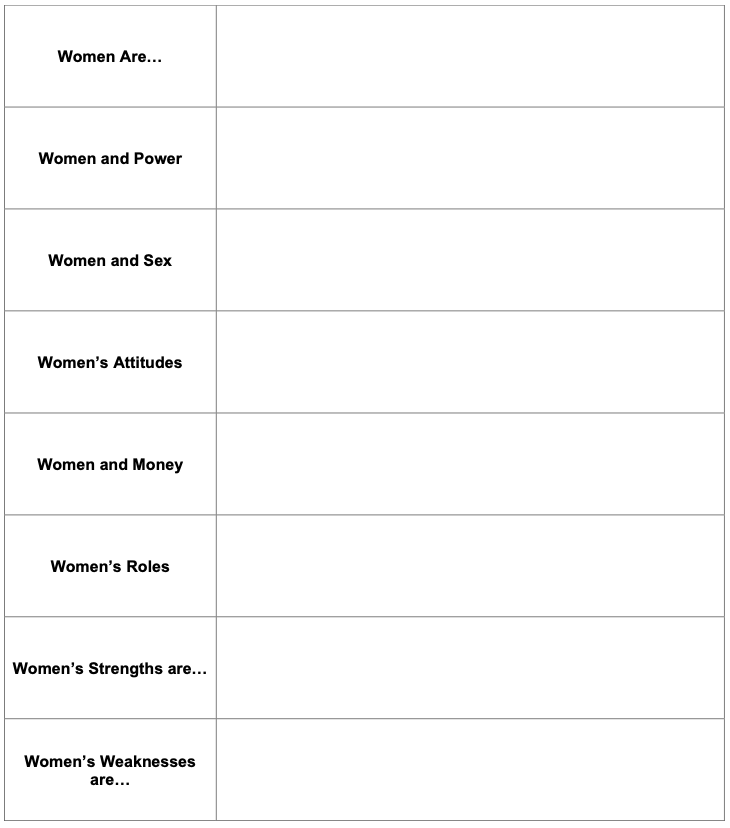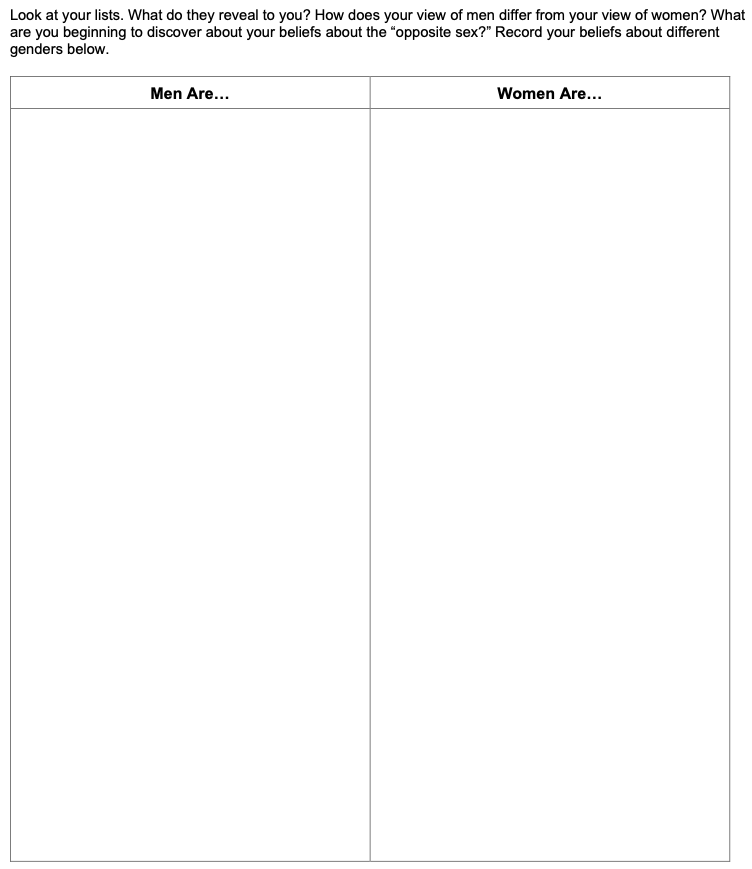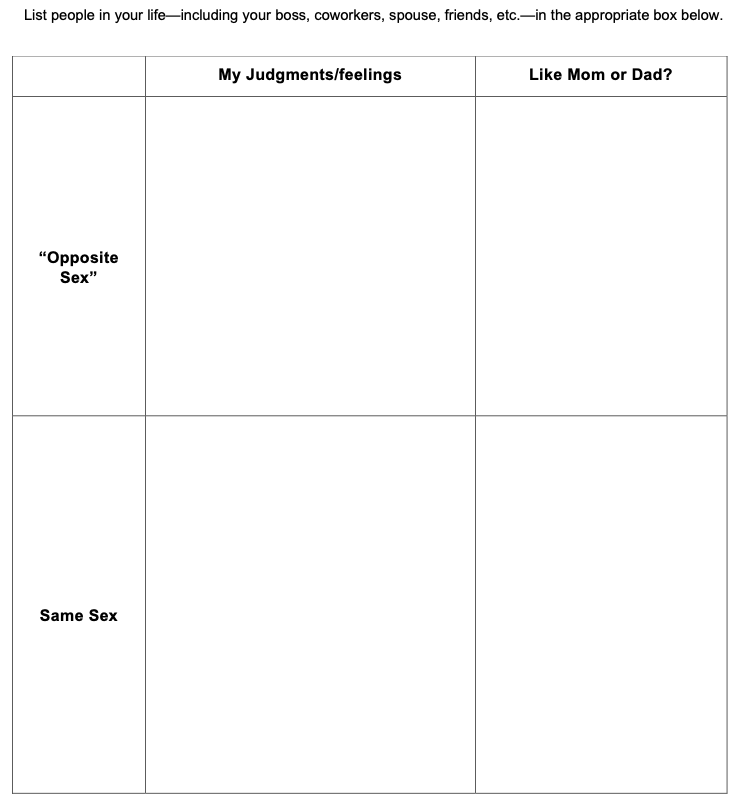BELIEFS ABOUT OPPOSITE SEX
Explore Your Biases, False Assumptions, and Other Limiting Views of an
“Opposite Sex”
Through your work, you are challenging many of the “myth-conceptions” formed from your early attachment patterns with your caregivers, your family programming, and your early experiences. You have noticed how you have been trained and conditioned to believe certain things that are not empowering and actually limit your experience of intimacy. You have begun to see how you create the world around you through the mechanism of projection—projecting aspects of yourself and transferring impressions of people from your past onto others, and not realizing that your feelings and impressions are often projections, not actual perceptions of the other. Once aware of these projections and transferences, you can begin to reclaim the projections. You start to see people more fully, for who they really are, and not just as your projection screen. You expand your capacity to interact with them in more real ways. By noticing and learning these things, you are developing the ability to forge deep, lasting relationships both personally and professionally.
This week, you apply what you have learned about your family rules, myths, and beliefs towards understanding your judgments, beliefs, assumptions, and resentments as they relate to an “opposite sex.” When we say “opposite sex” in the context of this assignment, we mean any gender identity that you see as other, or different from your own. You begin to become aware of your projections and transferences onto the “opposite sex,” which color your perception, reactions, feelings, and behavior toward them. You focus specifically on the beliefs you have about the “opposite sex” and discover how these beliefs either limit or enhance your satisfaction in relationships.
In previous lessons, you have discovered how powerful your early attachment experiences, conditioning, and training were in your development. You are seeing how your conditioning and early programming have defined you in many ways. Remember how you discovered the impact of your conditioning on your beliefs, how you see yourself, and how you operate in the world. Have you thought about how this has impacted your feelings towards the “opposite sex?” Have you explored how your relationship with your parents has impacted the way you act with men, women, and others? What mistaken beliefs about the “opposite sex” have you been carrying around with you that have unconsciously colored or defined your relationships? For example, the thoughts of “you’re just like my mother/father” often cross our minds or are actually spoken in the midst of a fight. What is the belief and attitude you are having in that moment about that gender?
You are discovering ways to become closer
to yourself and others in your life—to dare
to have greater intimacy and satisfaction
in your relationships.
Part of your job is to assess what is true for you and
what you value and believe, especially about
the “opposite sex.”
Often, we project the feelings, sensations, images, and perceptions we have of our father or our mother onto others. We unconsciously react to others as if they were our mother or our father (or other people close to us). The sea of our implicit memories floods forth in the moment, and we think it is an accurate perception of the other person. We see our boss, our date, or our spouse through the lens of our past. It is like we have a ‘father-lens’ or a ‘mother-lens’ through which we perceive the other.
When we were children early in our lives, we were influenced by the beliefs of our families, and we learned and took on certain responses, judgments, and opinions toward the “opposite sex.” How you treat people of different genders now has developed from being in your family and the world around you. You learned how to value, and what to expect of, the “opposite sex” — whether valid or not. You weren’t trained to consider that there might be many ways to see the world, let alone sex and gender.
For example, how many people feel that raising children is “a woman’s job”? While it may be true that women are more socialized in this way, it doesn’t mean that they have all the answers, or that they are the ones to be solely responsible for child-rearing. It may mean men need to be coached and supported on what to do. Women can be perceived to develop an edge or a tone in their voice as they intervene with men on parenting. Women may dismiss men; men may ignore women. Even our dismissals reveal our beliefs about the “opposite sex!” Our “myth-conceptions” are at play until we decide to become aware of them, reclaim our projections, and change our beliefs.
You continuously fall into “myth-conceptions” about the “opposite sex” throughout the day without even being aware of it. Your actions and thoughts reflect your unconscious, mistaken beliefs. If a female-presenting driver does something that annoys you, how many times have you justified your beliefs with thoughts like “typical woman driver”? If your man forgets to bring home something you asked for—“just like a guy”—how do you reinforce your belief?
There are behaviors that we define as more “womanly” or “manly” which shape our beliefs and attitudes about men and women—and about ourselves in our own gender identities. Historically, the garbage, the car, and fixing things in the house fall into the manly category, and dishes, cooking, and housecleaning fall into the womanly category. Or maybe there were other gendered roles or tasks in your family. Even though these are stereotypical beliefs, we learned them somewhere and place value on them without really evaluating them. For the most part, as a society, we don’t equally value the full continuum of masculine and feminine values—the yin and the yang. Both have their importance within ourselves and within our families, workplaces, and world. One is not more or less important—they are both necessary. However, our society tends to value masculine/yang more than feminine/yin.
Explore Your Attitudes About an “Opposite Sex”
Main Assignment
This week’s assignment helps you to see what you think about the “opposite sex.” It helps you to see how it has impacted the relationships you have with people of different genders and how to enhance your satisfaction with them.
Very-Able Assignments
Observe Your Attitudes Operating
Watch yourself this week and be on the lookout for your conscious and unconscious thoughts and attitudes toward the “opposite sex.” Think about your attitudes and opinions of the “opposite sex” at work, home, in relationship, and in the community. How do you view the opposite sex? What opinions do you have about them? What kind of thoughts do you have about them? Are your thoughts, comments, and judgments seductive, disdainful, humiliating, sexual, friendly, empowering, negating, neutral, disempowering, dismissive, kowtowing…? What do your reactions reveal to you? What are some of the beliefs you have about the “opposite sex?” What are the judgments? (You may want to go back and look at some of your family rules, myths, and beliefs and expand on them here.)
Think about these areas and what they may reveal to you.
Work
Home
In the kitchen…
In the bedroom…
In the garage…
Driving
Relationships
Achievement
Child-rearing and parenting
Community
Whatever you observe, record it in your journal or in the "Beliefs About the ‘Opposite Sex’" worksheet.
Have Meaningful Conversations with the “Opposite Sex”
Use your conversations this week as opportunities to uncover your beliefs about the “opposite sex.” As you engage in meaningful conversations, notice your judgments, assumptions, and beliefs about men and women, and about yourself and your gender. Record your conversation in your journal or in the worksheet.
She’s Just Like My Mom/He’s Just
Like My Dad
Make a list of your bosses, spouse, coworkers, and friends of the “opposite sex.” What are your opinions of them? Compare to your opinions of bosses, coworkers, or friends of the same gender. What is the difference? Identify the ways they are similar to your parents. Where are you “charged” with them? How much of that “charge” is truly about them? Record your judgments and feelings in your journal or in the worksheet.
I Am Man/I Am Woman/I Am…
Notice how you feel about yourself related to your gender. Do you feel you have an advantage? In what ways? Do you feel you have disadvantages—in what ways? How much do you like your gender experience? How do your feelings about yourself and your gender affect your life? Do your feelings and judgments empower you? Disempower you? Something in between? Do you feel proud to represent your gender? Or embarrassed or neutral or…?
Attitude Check
Pay attention this week to comments you make that reflect the beliefs you have towards the “opposite sex.” When you are dealing with other genders and your mouth creeps up in a sneer or your eyes roll, or you find yourself summarily dismissing them, or become disdainful, obsequious, flirtatious, domineering, passive, aggressive, nervous, plugged in…look to see what these reactions and attitudes have to say about your unconscious beliefs and predispositions toward the “opposite sex.” Write these attitudes and beliefs down on your "Beliefs About the ‘Opposite Sex’" worksheet. At the end of the week, reflect on what you are discovering about yourself and the “opposite sex”.
My Three Main Beliefs about the “Opposite Sex”
Review your week and look through your worksheets to determine your top three beliefs. Which ones seem the strongest, most pervasive, most entrenched, or most influential in your life? Which ones seem especially “true” to you? Of which ones do you think, “these aren’t beliefs, this is true, this is how it really is, men/women are really…”? These are clues to your most pervasive beliefs about the “opposite sex.” Write down these three main beliefs—you’ll need them for upcoming assignment!
Examine How Your Beliefs About the “Opposite Sex” Influence How You Think, Learn, Speak, and Invite to Your Life Team
How have your beliefs about the “opposite sex” influenced how you think and act? How have your thoughts developed? How does that influence how you invite people to join you on the journey? Consider sharing your discoveries with others and inspire them to explore this in their own life events.
Be aware of your beliefs and attitudes toward an “opposite sex” this week. Speak them out loud. Catch your thinking and judgments about this “opposite sex,” both positive and negative. How do you act/behave/talk with the “opposite sex?” What does that reveal about what you believe? What bugs you about the “opposite sex?” What golden projections do you have about the “opposite sex?”
Be aware of all your reactions to the “opposite sex” this week—visceral sensory or body responses, knee-jerk reactions, emotional responses, thoughts, judgments, critiques—whether positive or negative. For example, are you dismissive of the “opposite sex?” Fawning? Demeaning? Sarcastic? Uncomfortable? Accommodating? Careful? Do you shut down with the “opposite sex” or become more effusive or flirty? All of these reactions tell you things about your beliefs about the “opposite sex.”
Look for these reactions, thoughts, and feelings frequently throughout the day. These beliefs are often operating under the radar, under your conscious awareness. We often think it’s just the way it is, rather than being aware it is our beliefs coloring our experience, so you’ll need to bring this to conscious awareness.
Use the attached worksheets to explore your beliefs. Read the sentence stems and complete the sentence with as many thoughts, ideas, judgments, feelings, etc. that come to mind. Write as fast as you can; don’t edit—let anything that comes in your mind be recorded by your pen. In many ways in this assignment, you are saying the unsayable or acknowledging things that are taboo to speak about in our culture, but really give yourself permission to flow to the best of your ability. Set a timer for at least one minute for each category (two minutes is preferable) and free associate on the topic. Write everything that comes to mind. As you are exploring your beliefs about different genders, reflect on how that impacts your beliefs about the world and yourself. Document these discoveries in your journal to harvest these learns regularly.
When you know how your judgments and unconscious beliefs affect your behavior and thoughts, you can start peeling back the layers and start to actually see beneath your judgments. Keep exploring your way to deeper, more meaningful relationships with others.
As you engage in meaningful conversations, notice your judgments, assumptions, and beliefs about men and women, and about yourself and your gender.
Considering our beliefs, conscious or not, about the “opposite sex” helps us complete our unfinished business—to learn from the other, to honor our different gifts, and to develop levels of partnership beyond our wildest imaginings!
Beliefs about Men
Beliefs about Women
Summary: My Beliefs About an “Opposite Sex”
Just Like My Mom and Dad
I am Woman/I am Man/I Am…
Journaling About Myself and My Gender
Journal about these thoughts. Add to your Beliefs about the “Opposite Sex” form any beliefs that this exercise stirs up. Take a risk and share your reactions with a person of the “opposite sex.”






